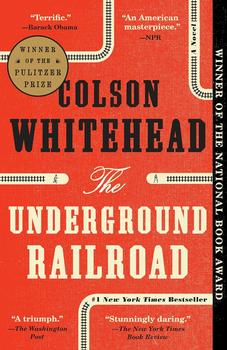Summary | Excerpt | Reading Guide | Discuss | Reviews | Beyond the Book | Readalikes | Genres & Themes | Author Bio

A Novel
by Colson WhiteheadExcerpt
The Underground Railroad
THE first time Caesar approached Cora about running north, she said no.
This was her grandmother talking. Cora's grandmother had never seen the ocean before that bright afternoon in the port of Ouidah and the water dazzled after her time in the fort's dungeon. The dungeon stored them until the ships arrived. Dahomeyan raiders kidnapped the men first, then returned to her village the next moon for the women and children, marching them in chains to the sea two by two. As she stared into the black doorway, Ajarry thought she'd be reunited with her father, down there in the dark. The survivors from her village told her that when her father couldn't keep the pace of the long march, the slavers stove in his head and left his body by the trail. Her mother had died years before.
Cora's grandmother was sold a few times on the trek to the fort, passed between slavers for cowrie shells and glass beads. It was hard to say how much they paid for her in Ouidah as she was part of a bulk purchase, eighty-eight human souls for sixty crates of rum and gunpowder, the price arrived upon after the standard haggling in Coast English. Able-bodied men and childbearing women fetched more than juveniles, making an individual accounting difficult.
The Nanny was out of Liverpool and had made two previous stops along the Gold Coast. The captain staggered his purchases, rather than find himself with cargo of singular culture and disposition. Who knew what brand of mutiny his captives might cook up if they shared a common tongue. This was the ship's final port of call before they crossed the Atlantic. Two yellow-haired sailors rowed Ajarry out to the ship, humming. White skin like bone.
The noxious air of the hold, the gloom of confinement, and the screams of those shackled to her contrived to drive Ajarry to madness. Because of her tender age, her captors did not immediately force their urges upon her, but eventually some of the more seasoned mates dragged her from the hold six weeks into the passage. She twice tried to kill herself on the voyage to America, once by denying herself food and then again by drowning. The sailors stymied her both times, versed in the schemes and inclinations of chattel. Ajarry didn't even make it to the gunwale when she tried to jump overboard. Her simpering posture and piteous aspect, recognizable from thousands of slaves before her, betrayed her intentions. Chained head to toe, head to toe, in exponential misery.
Although they had tried not to get separated at the auction in Ouidah, the rest of her family was purchased by Portuguese traders from the frigate Vivilia, next seen four months later drifting ten miles off Bermuda. Plague had claimed all on board. Authorities lit the ship on fire and watched her crackle and sink. Cora's grandmother knew nothing about the ship's fate. For the rest of her life she imagined her cousins worked for kind and generous masters up north, engaged in more forgiving trades than her own, weaving or spinning, nothing in the fields. In her stories, Isay and Sidoo and the rest somehow bought their way out of bondage and lived as free men and women in the City of Pennsylvania, a place she had overheard two white men discuss once. These fantasies gave Ajarry comfort when her burdens were such to splinter her into a thousand pieces.
The next time Cora's grandmother was sold was after a month in the pest house on Sullivan's Island, once the physicians certified her and the rest of the Nanny's cargo clear of illness. Another busy day on the Exchange. A big auction always drew a colorful crowd. Traders and procurers from up and down the coast converged on Charleston, checking the merchandise's eyes and joints and spines, wary of venereal distemper and other afflictions. Onlookers chewed fresh oysters and hot corn as the auctioneers shouted into the air. The slaves stood naked on the platform. There was a bidding war over a group of Ashanti studs, those Africans of renowned industry and musculature, and the foreman of a limestone quarry bought a bunch of pickaninnies in an astounding bargain. Cora's grandmother saw a little boy among the gawkers eating rock candy and wondered what he was putting in his mouth.
Excerpted from The Underground Railroad (Oprah's Book Club) by Colson Whitehead. Copyright © 2016 by Colson Whitehead. All rights reserved. No part of this excerpt may be reproduced or reprinted without permission in writing from the publisher.
Never doubt that a small group of thoughtful, committed people can change the world...
Click Here to find out who said this, as well as discovering other famous literary quotes!
Your guide toexceptional books
BookBrowse seeks out and recommends the best in contemporary fiction and nonfiction—books that not only engage and entertain but also deepen our understanding of ourselves and the world around us.